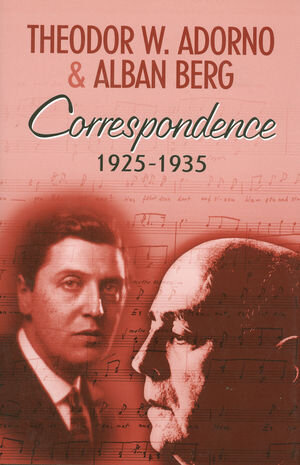Correspondence 1925-1935
von Theodor W. Adorno und Alban Berg, herausgegeben von Henri Lonitz, übersetzt von Wieland HobanAdorno was twenty-one years old when he traveled to Vienna in March1925 to study musical composition with Alban Berg. Twenty yearslater, Adorno wrote: „how much of my writing will remain is beyondmy knowledge or my control, but there is one claim I wish to stake: that I understand the language of birds,“ It was no less than thedesire to learn to speak this language that drew him to Berg. Adorno already knew what he wanted to drew to compose before hewent to Berg, and the aim of his stay in Vienna and the followingyears was to learn to put this knowledge of musical compositioninto practice.
His correspondence with Berg, who was soon to be world famous, is partly defined by his engagement with the compositional problemsposed for the musical avant-garde by Schoenberg's discoveryof the twelve-tone technique, for which Adorno was to become anadvocate, not least in Vienna and through Berg. This correspondencedocuments how he wrote numerous essays on Berg, Webern andSchoenberg during this time, and tried in vain to establish aplatform for the Second Viennese School against „moderatedmodernity“ in the journal Anbruch, where he exerted considerableeditorial influence. It also shows how much Adorno -continually admonished by Berg to focus only on his musicalcomposition - strove to reconcile his academic duties and hisliterary and journalistic work with the constant which to donothing more than compose.
His correspondence with Berg, who was soon to be world famous, is partly defined by his engagement with the compositional problemsposed for the musical avant-garde by Schoenberg's discoveryof the twelve-tone technique, for which Adorno was to become anadvocate, not least in Vienna and through Berg. This correspondencedocuments how he wrote numerous essays on Berg, Webern andSchoenberg during this time, and tried in vain to establish aplatform for the Second Viennese School against „moderatedmodernity“ in the journal Anbruch, where he exerted considerableeditorial influence. It also shows how much Adorno -continually admonished by Berg to focus only on his musicalcomposition - strove to reconcile his academic duties and hisliterary and journalistic work with the constant which to donothing more than compose.






